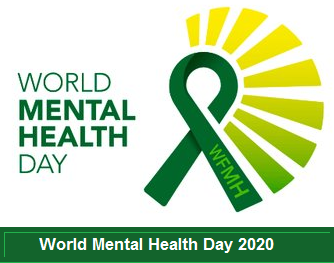In celebration of World Mental Health Day for 2020, we take a look back at the tips provided by Janet Lallysmith at our recent “Looking after your Mental Health” workshop – and how our students have benefited from the event.
As part of our Welcome (back) programme of events, we were excited to offer a special “Looking after your Mental Health” workshop, delivered by Janet Lallysmith, a qualified mental health practitioner. The workshop aimed to increase awareness and knowledge about student mental health, including the additional challenges facing students who start this year. She also discussed self-care and helped students identify when and how to access additional support to help you have a positive student experience at Kent. You can view the event here.
As part of the event, students were able to ask questions – here we share the responses from Janet, along with some mental health resources and tips and feedback from our students following the event to help you look after your Mental Health.
Q&A from the event
What do we do if we have trouble sleeping and clearing our mind?
How can we deal with headaches from stress other than medicine?
How do you manage depression?
How can you best spot and aid mental health difficulties in housemates?
How can I cope with living with panic attacks?
If we are worried about our mental health where can we go to be checked? Especially if we aren’t from the local area?
I am a third year student and have previously struggled with juggling with a long term relationship and commitments/work load at uni what can I do to split my time, or feel less stressed?
How could you stop doing bad habits just because the stress?
Outside of just dropping hints, is there an easy way to tell people that you are more sensitive to things and may perceive situations differently?
Mental Health Resources and Tips
- Student Minds offers web-based resources specifically for students – check out it out at https://www.studentminds.org.uk. As well as tips and support for yourself, Student Minds also has info about how to start a conversation with a friend and what to do if you’re concerned that another student is struggling with their mental health.
- Student Space has been created by Student Minds specifically to help students with the unique challenges of studying in a time of Covid19. Personalised support via text or email is available 24/7, while you can speak with a trained volunteer on the phone or to others via an online forum from 4-11pm every day. All the info is here https://studentspace.org.uk/
- Resilience is about adapting to adverse and changing circumstances – looking after yourself physically and emotionally, building social connections and developing coping strategies are its foundations. Prioritise sleep, exercise and good food, make contact with those around you and do what makes you feel good!
- Check out how the University of Kent will be helping students to socialise safely during Welcome Week and beyond https://www.kent.ac.uk/safe-study-social/lets-be-social
- What’s filling up your stress bucket? Although we might not be able to reduce stresses building up, we can make sure that we turn on our self-care taps to ensure that our bucket doesn’t overflow. Check out this video by Braive https://www.youtube.com/watch?v=1KYC5SsJjx8
Feedback from our students
Following the event, we asked attendees to fill in a short survey.
They told us that, thanks to the workshop they will try something to help improve their mental health – why not give their tips and ideas a go?
- Talk to my housemates
- Check up regularly with my friends to see how they are
- Try to get exercise
- Create and maintain some structure in my day so that I can keep on top of things that are important
- Stay away my computer when I can
- Sleep better – to improve my mental performance
- When the pressure of anxiety kicks in, I will try to address it calmly and use breathing techniques.
And remember, if you have any worries about your own – or others – mental health, please do reach out to us. You can contact the nats Support team for more help.

